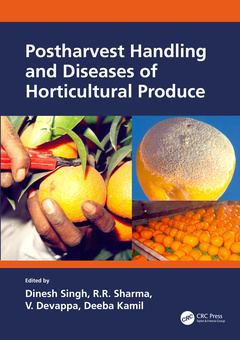Description
Postharvest Handling and Diseases of Horticultural Produce
Coordinators: Singh Dinesh, Sharma Ram Roshan, Devappa V., Kamil Deeba
Language: English
Subjects for Postharvest Handling and Diseases of Horticultural Produce:
Keywords
Postharvest Diseases; Postharvest Pathogens; Tropical Tuber Crops; Soft Rot; Postharvest Losses; Grey Mould; Disease Cycle; BCAs; Essential Oils; Stem End Rot; Fruit Rot; Rhizopus Rot; Postharvest Handling; Postharvest Decay; Rhizopus Stolonifer; Tamil Nadu; Postharvest Disease Control; Mummified Fruits; Synthetic Fungicides; Alternaria Rot; Infected Fruits; Bacterial Soft Rot; Monilinia Fructicola; Causal Organism; Hot Water Treatment
· 21x28 cm · Hardback
Description
/li>Contents
/li>Readership
/li>Biography
/li>
Postharvest Handling and Diseases of Horticultural Produce describes all the postharvest techniques, handling, pre-cooling, postharvest treatment, edible coating and storage of the horticultural produce available to handle perishable horticultural food commodities, covering the areas of horticulture, agricultural process engineering, postharvest technology, plant pathology and microbiology. Postharvest diseases of major fruits and vegetables, with their causal agents, are described. The integrative strategies for management of postharvest diseases include effectively inhibiting the growth of pathogens, enhancing the resistance of hosts and improving environmental conditions, with results that are favourable to the host and unfavourable to the pathogen growth, including biotechnological approaches. Adopting a thematic style, chapters are organized by type of treatment, with sections devoted to postharvest risk factors and their amelioration. The chapters are written by experts in the fields of plant pathology, horticulture, food science, etc. Core insights into identifying and utilizing appropriate postharvest options for minimizing postharvest losses and enhancing benefits to end-users are also provided.
Features
- Presents the most recent developments in the field of postharvest handling technologies and diseases in a single volume
- Includes postharvest diseases of cut flowers, fruits, vegetables and tuber crops.
- Appropriate for students, researchers and professionals
- Written by experts and can be used as a reference resource
1. Postharvest Losses of Horticultural Produce. 2. Postharvest Losses of Horticultural Produce. 3. Postharvest Handling of Fruits and Vegetables for Disease Management. 4. Postharvest Treatments for Horticultural Produce. 5. Management of Postharvest Diseases of Fruits and Vegetables through Chemicals. 6. Biocontrol of Postharvest Pathogens Affecting Perishable Horticultural Commodities. 7. Endophytes for Postharvest Disease Management in Vegetables and Fruits. 8. Management of Postharvest Diseases of Fruits and Vegetables through Yeasts. 9. Management of Postharvest Diseases in Fruits and Vegetables Using Botanicals. 10. Edible Coatings for Quality and Disease Management of Fruits and Vegetables. 11. Mycotoxins and Their Impacts on Human, Plant and Animal Health. 12. Characterization and Detection of Mycotoxins from Fruits and Vegetables. 13. Application and Monitoring of Health Hazard and Codex Alimentation for Product and Commodity. 14. Recent Advances in Postharvest Handling and Management of Citrus Diseases. 15. Postharvest Diseases of Mango and Their Management. 16. Postharvest Diseases of Banana and Their Management. 17. Postharvest Diseases of Grapes and Their Management. 18. Postharvest Diseases of Guava (Psidium guajava L.) and Their Management. 19. Postharvest Diseases of Litchi and Their Management. 20. Postharvest Diseases of Papaya and Their Management. 21. Management Postharvest Diseases of Peach Fruits and Their Management. 22. Postharvest Fungal Diseases in Stone Fruits and Their Management. 23. Postharvest Diseases and Disorders of Apple: Perspectives for Integrated Management. 24. Postharvest Diseases of Strawberry and Their Management. 25. Postharvest Diseases of Pineapple and Their Management. 26. Postharvest Diseases of Minor Fruits and Their Management. 27. Postharvest Diseases of Potato and Their Management. 28. Postharvest Diseases of Tomato and Their Management. 29. Postharvest Diseases of Capsicum sp. and Brinjal and Their Management. 30. Recent Advances in the Management of Postharvest Diseases of Onion and Garlic. 31. Postharvest Diseases of Cucurbitaceous Fruits and Their Management. 32. Postharvest Diseases of Cole Crops and Their Management. 33. Postharvest Diseases of Leguminous Vegetable Crops and Their Management. 34. Postharvest Diseases of Tropical Tuber Crops and Their Management. 35. Postharvest Handling and Disease Management of Cut Flowers.
Dr. Dinesh Singh (Principal Scientist), ICAR- IARI, New Delhi did his M. SC (Ag) and Ph. D. from Institute of Agricultural Sciences, BHU, Varanasi. He joined ARS services in January 1997 at IIVR, Varanasi and presently working as Principal Scientist at Division of Plant Pathology, ICAR- IARI, New Delhi. Dr. Singh has made significant contribution broadly in area of Plant Bacteriology and post harvest disease management. Dr. Singh has made significant contribution broadly in area of Plant Bacteriology. He characterized and deposited 176 isolates of Ralstonia solanacerarum, 217 isolates of Xanthomonas campestris pv. campestris, 6 isolates of X. oryzae pv. oryzae, 31 isolates of X. vesicatoria, 45 isolates of Bacillus spp. (B. subtilis, B. amyloliquifaciens,B. pumilus, B. cereus in the ITCC, Division of Plant Pathology, IARI, New Delhi. He developed multiplex - PCR based sensitive, specific and reliable protocol for simultaneous detection of R. solanacearum and Erwinia carotovora subsp. carotovora from potato tubers. He characterized two races of Ralstonia solanacerarum (Race 1 and race 3) and 3 races of X. campestris pv. campestris ( race 1, 4 & 6) from India. He developed talc based formulation of bacterial antagonists such as Pseudomonas flourescens DTPF-3, Bacillus subtilis DTBS-5 and Bacillus amyloliquefaciens DTBA-11 effective against fungal, bacterial diseases of plants. He has guided 4 Ph. D and 2 M. Sc. students in the field of plant bacteriology. He has published 122 research papers in pear reviewed reputed journals, 44 popular articles, 20 books, 79 book chapters, 5 technical bulletins, 8 training manuals and 2 practical manuals. He has been honoured and awards such as NESA Fellowship, NABS Fellow, IPS Fellow, SPPS Fellow, Bioved Fellowship Award, Honorary Fellowship Indian Mycological Society (FIMS) (2




